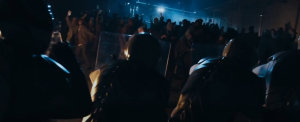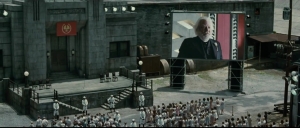This review contains spoilers for a film currently in theaters
Director: Francis Lawrence
The Hunger Games: Catching Fire is the sequel to the film Hunger Games and is the next adaptation of the Suzanne Collins novels of the same name. Like the first film, Catching Fire is primarily about oppression and resistance and ultimately, revolution.
This film picks up where the last left off, the main character Katniss Everdeen (played by Jennifer Lawrence) is pressured to go on a tour of the entire country to placate the increasing revolutionary feeling of the people outside of the oppressive capital. During her tour it becomes clear to Kaniss that the entire event is an attempt to pacify the population and distract them from their real problems which is most evidenced by her first stop when the high level of security clearly represents the repressive nature of the capital. A sort of public relations struggle between her and the leader of the nation emerges as he puts increased pressure on her to do the will of the central government.
Eventually, the government announces that there will be a special “hunger games” (the event where each of the “districts” of the government has to contribute one “tribute” in a free for all battle to the death as punishment for a failed rebellion by the districts against the capital some time in the past) that will be comprised of past winners. This move is made to quell the popularity of Katniss and reduce the chances of her popularity as a symbol of resistance.
From this point in the film on, plot twists and developments reveal that a new rebellion by the districts is brewing and that the tributes in the new hunger games are conspiring to foment the uprising. Katniss throughout both films is a sort of reluctant hero of rebellion and remains so until the end of this film where she eventually destroys the very arena where the hunger games are being played in a defiant act which helps to spark a much broader uprising. The film ends with her learning that her home district has been destroyed by the capital and implies that she will seek revenge.
One major contrast of this sequel to the first is the use of a more explicitly fascist aesthetic. This comes through most clearly during a scene in the capitol that is reminiscent of the first shots of Rome in the film Gladiator. The first Hunger Games relied on a much more subtle way of showing the repressive nature of the regime of the capitol. Besides the existence of the hunger games themselves which are the most obvious form of oppression, the first film showed the capital’s culture as similar to contemporary capitalism: joyous masses being distracted by superficial pastimes like obsessing over game shows with a very bright fashion sense. This is in contrast to more traditional depictions of authoritarian dystopian futures like in Nineteen Eighty Four where everything is dark and bleak. But in this sequel, we are shown more traditional dystopian aspects of a future society that come through as an anti-fascist commentary.
On top of painting a relatively detailed dystopian world, Catching Fire is also to a limited extent a call to revolution. Besides being a major plot point that is revealed towards the end, in both films the air of discontent by the masses of people is an important part of how the world the films operate. Donald Sutherland even recently went as far as to say the he wanted the film to “stir up a revolution” which goes to show that this interpretation of the film as a call to revolt is not incredibly far fetched.






You must be logged in to post a comment.